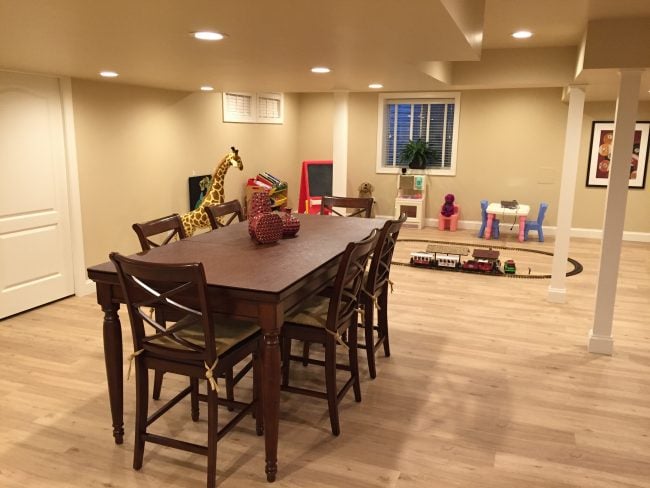
None can deny the appeal of a hardwood floor. It has a long tradition of luxury, and a timeless beauty. Installing a hardwood floor is also expensive and difficult. Those looking for that classic look and feel might do well to consider engineered hardwood flooring. When determining whether or not to invest in engineered wood flooring, here are the essentials to keep in mind.
Engineered Hardwood
Unlike conventional hardwood, which comes straight out of a tree and into your home, engineered hardwood is a more complex product that consists of several layers. The outermost is a hardwood veneer, a thin slice of wood (less than 1/8″) of whatever species you desire. The inner layers are made of plywood, high density fiberboard, or hardwood. The core layers make the product more stable than regular hardwood, while the outer veneer surface adds beauty and authenticity.
Engineered hardwood is different than a hardwood laminate because the surface is made of real wood. While laminate has a core of high density fiberboard, its surface is basically a picture of wood (or any other material, for that matter). Laminate is less expensive than engineered and solid hardwood, but has a different look and feel due to its make up.
Pros:
- Engineered hardwood flooring is designed to reduce the moisture problems associated with conventional hardwood.
- Its layers block moisture and provide added stability to your floor.
- Engineered flooring will not swell or warp, making it very low maintenance.
Environmental Advantages of Engineered Hardwood
Choosing engineered flooring is considered more environmentally-friendly than traditional hardwood for a few reasons.
- Veneer is sliced rather than cut with a saw. This process produces no sawdust, which means that all of the tree’s wood can be used. The sawdust produced making hardwood boards is wasted wood (and adds up to a significant amount).
- Hardwood trees grow much more slowly than the trees used to make engineered flooring cores. Because more surface area is produced making veneer, installing traditional hardwood uses many times the amount of slow growing tree. This makes the replenishing time much longer.
Engineered Hardwood Flooring Cons
There are, in actuality, very few principle drawbacks to this type of hardwood flooring, but this doesn’t make it a foolproof project or even the right floor for every application.
- Comparable to solid hardwood in terms of cost, engineered floors are still considerably more expensive than laminate, tile, and carpet.
- That said, by far, the biggest concern as a homeowner should be avoiding shoddy or inferior engineered manufacturers and products.
- Veneers that are too thin will prevent sanding and refinishing opportunities that may double the lifetime of the floor.
- Some veneers are so thin and poorly made that they can prematurely warp or fade.
- Core layers must still be fashioned from high-quality wood. Some manufacturers try to cut corners by using fiberboard or oriented strand board that may compromise the stability of your floor and, at the very least, will result in an inferior flooring product.
Is The Floor Worth It?
Engineered flooring is definitively easier to install, in fact, some handy homeowners are even enticed into installing their own engineered floors. It’s still a major project with big financial implications, so don’t over-reach on your home improvement skills. Even for the majority of homeowners who hire a flooring contractor for the job, you’ll save a hefty sum on installation, which is important given that most engineered flooring is more expensive than solid wood.
High-quality engineered floors (thick veneers, quality substrate) will usually cost somewhere between $8 and $12 per square foot. How much extra money this costs and whether cheaper installation offsets this price often depends on the type of wood you’re choosing. With an exotic or even highly-coveted hardwood, such as maple, engineered flooring is likely to be cheaper overall. For more common hardwoods, solid wood flooring may be cheaper overall, although it will still take longer to install.
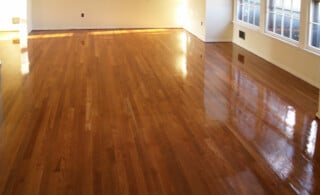 Insulating a Wood Floor
Insulating a Wood Floor 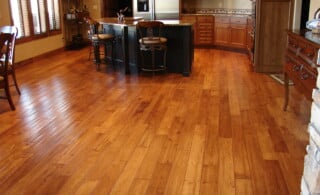 Cypress and Hickory Wood Flooring
Cypress and Hickory Wood Flooring 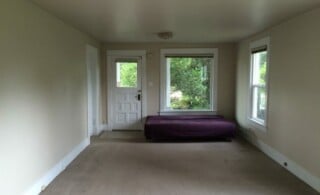 How to Hide Pesky Carpet Seams
How to Hide Pesky Carpet Seams 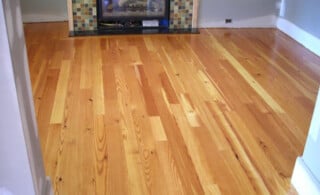 Divine Pine Flooring
Divine Pine Flooring 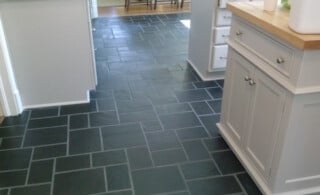 Slate Floors Make for a Great Decor
Slate Floors Make for a Great Decor 

My hardwood floor which is polished and colored at the factory is loosing the top color in front of a large window in my kitchen. I thought these factory finished floors were supposed to keep their top color always. What can I do to bring ” life” back in this area. It only has specks of the original color on some of the planks. I had thought I might need to replace the slabs that had lost it top finish. Do you have any suggestions for me?
Be very careful with engineered floors! We had them installed two years ago Rodenbaugh Floors, Allen Texas) the installer took readings that were dry due to a 3 year drought. Unfortunately, In less than a year, when the water returned to the ground and slab the floors buckled and blistered and had to be replaced because of bacteria and mold growth under them. The vender refused to replace or compensate for his not advising of the potential issue which could have been avoided by proper installation with moisture resistant processes.
This article is confusing and contradicts itself no less than four times in talking about the cost of engineered flooring. In the second paragraph it states “The cost of engineered flooring is another selling point.” Then goes onto state that “engineered flooring is cheaper from the start.” The article then claims “you’ll save a hefty bundle on installation” and then says “that’s important because engineered flooring is more expensive than solid wood flooring” even though in the previous paragraph it stated the engineered flooring and solid wood flooring were comparable in cost. In another section the article goes to some lenght to explain why engineered flooring is “cheaper from the start” because only a thin slice of wood is needed. The article never explains why engineered flooring in cheaper to install nor gives any example or frame of reference for this “bundle of cash” you will save on installation.
Heads up on all engineered hardwoods. One, make sure what you buy in samples is exactly what you receive before installing. Too many times the flooring is not the same. Two, always use a moisture barrier (rolled plastic about 60 cents a square foot) and a high grade moisture barrier glue down. If you’re reading this and thinking a floating floor or simple click and go floor is simple, trust me, it is not. GLUE THE FLOOR DOWN WITH QUALITY GLUE. You’ll thank me later. And, lastly…and I mean sincerely…make sure to lay out the floor dry first. THE WHOLE FLOOR! Walk around the rooms over three days (72 hours) while the room acclimates and play with the boards. make each room exactly the way you like it and then install the planks. Too often, people open a box and get to it only to have ugly boards in the middle of the room and other boards popping because they were unfit for installation. Laying doors is not that difficult. Yes, you can do it yourself, just do it right. Learn as much as you can and forget about short cuts. They will only cause problems later on. Hope this saves someone…cheers!
Engineered hardwoods ARE more expensive than solid hardwoods but, your installation costs are lower and you can install them below grade. The colors you see on samples will vary from the samples you see in the store because wood is a natural product!! Always let your wood acclimate at least 72 hours and you must continue to keep your house at a relatively low humidity forever after…Remember to take boards from different boxes if you’re installing yourself. That way you’ll get a consistent variance.
We bought a new home from “Century Builders” (do NOT recommend them!) & had engineered floors installed. Our floors LOOK beautiful but they snap crackle & pop! We are still fighting with “Century” to fix the problem. They have sent all the experts out including the manufacture rep & no resolution yet, it’s been a year & we need some “sound” advise from someone that won’t be pointing fingers at each other! Help!
I disagree with the statements about laminates being almost impossible to scratch. My house is 5 years old, and my floors are ruined from our dogs’ feet. We keep them groomed, of course, and one only weighs 8 pounds. But our English Bulldog pushes off when she runs (and boy howdy, she loves to run…) and she has laid waste to our laminate floors. I am looking for some kind of flooring that is indestructible, looks ok, and is easy to care for.
I’m thinking about heading out and finding an abandoned barn, taking the wooden beams and gluing them to the floor. I’m pretty sure she couldn’t hurt that. The only other thing to do is give up and let her have the house and I’ll have a dog house out in the had. It’d be easier to clean, at least…
I agree about dogs and laminatesee. We had to b travel a lot and left house sitters and potty pads for our three dogs but the lack of routine caused them to use the potty pads more than usual and the laminate us ruined in the areas that the dogs missed the pads or urine ran under the pads. I will probably replace the whole floor so the new will match. I am looking at the vinyl planks because of the dogs.
Susan and Polly, for active dogs low luster tile is best. If money isn’t as mush an issues stone is great because it is a consistent color and texture throughout and scratches or chips don’t mar it’s appearance.
Good luck finding out even the most basic facts with a web search. I cannot find the veneer thickness nor whether the surface is sealed/coated much less an independent review that compares products. Tons of advice about 2mm thick veneer or more but zero info about what products HAVE 2mm+ veneer. The mfg sites don’t give stats on their own products.
I put in a thick engineered hardwood floor. I didn’t have a dehumidifier at first. The boards’ sides started bowing up and the finish wrinkled in spots. They flattened out when I got a kickass dehumidifier but some of the wrinkling was permanent. So if you don’t have good air conditioning, I don’t know… Also, they definitely scratch more than an old time floor with varnish. We dance tango and the family room floor is covered with spiral scratches. I’m sure dog claws would do a number on it as well. Everywhere else looks great, though. Also, the floor seems very water resistant. A lighter color/stain would show the defects less. Professional installation was very fast and did not involve stinky polyurethane products. THe entire process was definitely less $ than actual wood, especially if you want an exotic wood.
I have a 60 pound dog, will the engineered floor hold up to her claws.
Moving to first floor condo that was originally a school so it is very old buiIding. I want to remove carpeting and put engineered hardwood flooring over the concrete . One installer wants to use floating and another wants to use glue? Obviously I do not want any squeaking so what is your opinion?
Thanks for any advice
Where I live, engineered flooring is at least $1 a square foot less than solid hardwood flooring.
My sister has 9 year eng. floor. After organically cleaning her floors an then just using vinegar an water an the just water. She can wipe with clean white rag an still looks dirty. Help
there are pros and cons to solid and engineered. Solid has more longevity as you can refinish it over time many times. then engineered is genetically more stable to moisture conditions therefor less warping and cupping. the cost to install the solid and laminate is exactly the same! If you want a wood floor to never squeak or crack you must glue it. Houses settle and floor boards move so hence does your wood floor. The more solid the foundation the better off you will be. Be sure and do your moisture tests before installation and keep your temperature in your house at a steady temp. Scratches can be repaired and boards can be replaced. make sure when selecting your floor do your homework on the hardness of the wood species you are considering. Do not expect a cherry floor to act like a hickory floor the are not genetically the same. A soft wood will scratch much quicker than a hard wood. Laminate is in its own category it is not a wood floor. Laminate is scratch resistant but does not tolerate water or pet accidents or simple mopping. most people don’t want to spend the money and that is why they are getting laminate to begin with. Cheap laminate is just that cheap and wont last long. A high quality laminate will definitely perform better but will cost you closer to what a hardwood or engineered floor could cost.
soooo… do your homework. figure out what you really want then save up to do it right! do not let some handyman install your expensive new floors! make sure and used a professional that will warranty their work and do a custom job. Hard wood floors are an investment you should enjoy for years to come if you do it correctly.
I have engineered floors glued down. I want to say that they are easily scratched by dogs because my cats have scratched them up pretty good. Also the sun faded them probably three or four shades lighter near the kitchen slider. Had I known this was happening I would have placed an 8 by 10 rug there. My biggest regret is having them glued down. Having them floated would have been preferable because now I have to remove them and it is nearly impossible to remove glued down engineered floors. Glue down is a permanent solution to a temporary situation.
Be sure to bring home a sample of your wood flooring options before making your decision, since the lighting in your home will very likely look very different from how they looked in the store’s showroom!
Beware of ‘value’ priced engineered hardwood flooring. I bought loads of it and can’t use half of it. Some planks are blemished badly while others are tongued and grooved inconsistently. My installer is truly frustrated. So, a job that should have been done days ago is still not finished and I’m not sure I have enough product. You see when boxes were opened, some was a different color and different size width plank. Somehow we have to make this disaster work.
What do y’all think about LVP as a flooring option in comparison to hardwood flooring? One thing I’ve come across in my research is something called the Embossed in Register (ER) Technique. Basically, it’s a technique that allows the board to be embossed completely like the original graphic/board, also called the register. This means it will look and feel just like real hardwood. From the feel of each individual grain all the way down to wood knots. It’s something I’m pretty interested in because I’m a huge fan of the hardwood look and this way I and others wouldn’t have to pay the premium for it. Let me know what you think!